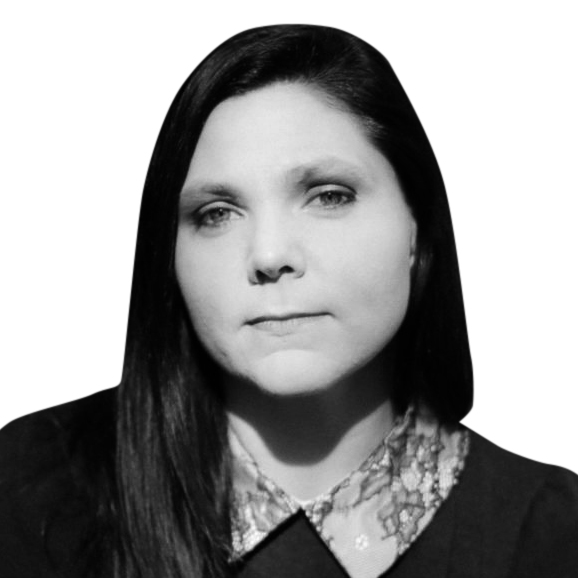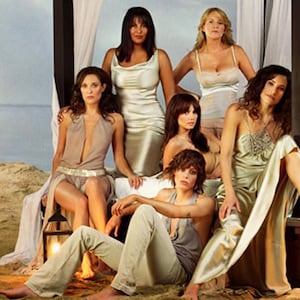What is it like to have The L Word back? The answer is: very welcome, though with reservations. But at least television’s only all-lesbian drama is returned to bright, familiarly glossy life, its old-meets-new group of characters looking way more diverse than before. (Warning: light spoilers follow.)
On Sunday night, Showtime’s The L Word: Generation Q begins, 10 years after The L Word went off the air. Its original showrunner Ilene Chaiken has passed the baton to playwright-turned-screenwriter Marja-Lewis Ryan, who has had many tough decisions to make (one: get rid of that god-awful Betty theme song). While the original show had many fans, it also had just as many critics—some, like this reviewer, serving as both.
Like the original, Generation Q centers on a group of friends—in this case, returning leads Bette (Jennifer Beals), Alice (Leisha Hailey), and Shane (Katherine Moennig) as well as a younger, queerer cast of newcomers, namely androgynous fuckboi Finley (Jacqueline Toboni); Latinx PR exec Dani (Arienne Mandi); her partner, Afro-Dominican television producer Sophie (Rosanny Zayas); and their roommate, gay Asian trans TA Micah (Leo Sheng).
Ryan had some course correction to do with Q, and that is ultimately what is so frustrating about the first three episodes. Because while the self-coined “OGs” provide for a welcoming nostalgia, the new characters and their storylines feel too frequently devoid of emotional depth, at least in the earliest episodes available for review.
Too often, their story arcs and dialogue are fraught with melodrama and cliches and don’t earn viewers’ affinity just yet. We don’t know much about who they are as people, aside from what diversity boxes they check off for a show whose biggest failure was accurately servicing the vast community it claimed to. (It’s worth noting that there is not much in the way of body or economic diversity. Perhaps that doesn't fit into the show’s idea of “aspirational”?)
Now, the soap has turned a little too self-aware and, except for the sex scenes, feels like it might be more at home on Lifetime than Showtime.
It’s no fault of the actors, who are clearly better than what they are being provided with and, in stark contrast to the original, are all part of the LGBTQ community. (Hailey was the only openly gay cast member when The L Word was on air.)
Another evolution from the original: several of the new regular and recurring cast members are people of color, the actors from the same ethnic background of their characters. (To paraphrase Ilene Chaiken's speaking before Showtime's premiere in Los Angeles on Monday, a lot of what has been expected from viewers and the community has changed in between shows.)
But in reality, what’s changed is not what viewers expect but how accountable networks and producers have to be to viewers and the populations they represent in 2019, and Generation Q is proof of how an attempt to right some longstanding wrongs can leave "diverse" characters delivered half-empty.
At this point, there’s a clear divide between the richness and affection afforded to Bette, Alice, and Shane (though it's disappointing there are no other returning cast members from The L Word, at least not yet), and the new contingent—despite their being woven into The L Word world through jobs at both Bette’s campaign to become mayor of Los Angeles and the daytime television talk show Alice presides over—fails to capture the lightning-in-a-bottle effect The L Word once had.
That lightning-in-a-bottle really was something. The L Word premiered at a time when lesbians were expected to be grateful for anything they were given. It was 2004, and the success of the network's American take on the British hit Queer as Folk afforded The L Word creators Ilene Chaiken, Michele Abbott, and Kathy Greenberg a chance at a sexy, Sapphic soap that would appeal not just to the queer community, but to voyeuristic straight viewers.
Early advertisements and photoshoots had the cast hyper-sexually posed, naked, holding, hugging, or sometimes draping themselves on top of one another.
Ten years later, lesbian and otherwise queer visibility has become much more celebrated. The CW has openly gay actress Ruby Rose starring as the lesbian lead in Batwoman, while Ellen DeGeneres continues to dominate daytime and Kristen Stewart, now out and proud, will star alongside Mackenzie Davis in Happiest Season, an upcoming holiday-themed rom-com about two women in love, directed by Clea Duvall.
This would have felt like a fantasy in the early-2000s, when The L Word was the rare pop culture offering that portrayed lesbian, bisexual, and queer women in relation not just to the wider world, but to each other. It was insider baseball for a community of people long ignored and otherwise invisible.
At the height of pre-streaming scheduling your entire day around a television show, The L Word was must-see TV that became watercooler talk for now going on 15 years, viewing parties, trivia nights, and all.
In its imperfect, uplifting, and oftentimes sending-up of women-loving-women culture, The L Word created a space for queer women to take full ownership, adopting the characters, their quips, their quirks, and their storylines into their own lives as shared vernacular; a lesbian shorthand.
So when Showtime announced it was rebooting The L Word, fans rejoiced. For years, viewers tired of rewatching the first six seasons had begged for its return, never having found a true replacement for the one series that suggested their lives and personalities could center not just around their identities, but their community.
Because Generation Q is, in effect, an entirely new show, it is missing some of what made the original so special—Erin Daniels as fan-favorite Dana, for one, as her being killed by cancer in Season 3 has been a continuous point of pain, and Mia Kirshner as series lead Jenny Schecter, whose moving to West Hollywood and realizing her queer identity in Season 1 guided viewers into the real lives of primarily rich, white, cis lesbians in Los Angeles. (Her mysterious, series-ending cliff-hanging death is explained in an early episode, but given very little resonance.)
Also MIA is Tina (Laurel Holloman), whose marriage to Bette has dissolved but leaves them long-distance co-parenting, and difficult for “Tibette” fans to wrestle with any other love interest Bette has moving forward.
Alice’s new talk show does allow for special guests to make appearances, but it feels somehow more contrived than the Sleater-Kinney pop-ups at The Planet or Catherine Opie art shows. Sure, Bette, Alice, and Shane are still friends, but now they’re meeting for brunch on a weekday instead of at The Planet on their way to work, and the conversations are less spirited.
Bette’s daughter is a smart but tempestuous teen while Alice is learning how to step-parent her new girlfriend's two young kids. Shane is still Shane, down to her Sally Hershberger-inspired haircut. Recurring actors Brian Michael Smith, Olivia Thirlby and Fortune Feimster are all underutilized as Bette's campaign manager, Finley’s love interest, and Alice's talk show sidekick, respectively.
The L Word: Generation Q has room to grow, but like its predecessor, it will have a big, rainbow spotlight on its growing pains. It shouldn't be on one single television series to represent a community as specific and expansive as the LGBTQ community is and will continue to be; it is an impossible task for The L Word: Generation Q and other LGBTQ-themed TV shows to make everyone happy. (Just ask Looking.)
But in a revolutionary time for great storytelling on television, we also deserve a delicious drama not just born out of our diversity but expanded upon in the way that Starz’s Vida has done so successfully for queer and Latinx people.
It is satisfying to revisit some of the well-trodden stories of The L Word through Bette’s continuous bad decision-making and devil-may-care attitude about infidelity, and Shane’s attempts to distract herself from any emotional investment, but the disconnect between new and old may not fuse quickly enough for some fans to stick with their Showtime subscription. Welcome back The L Word. Now, go find yourself.





